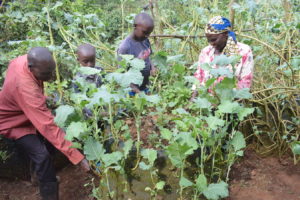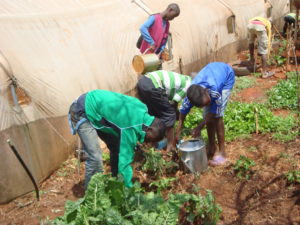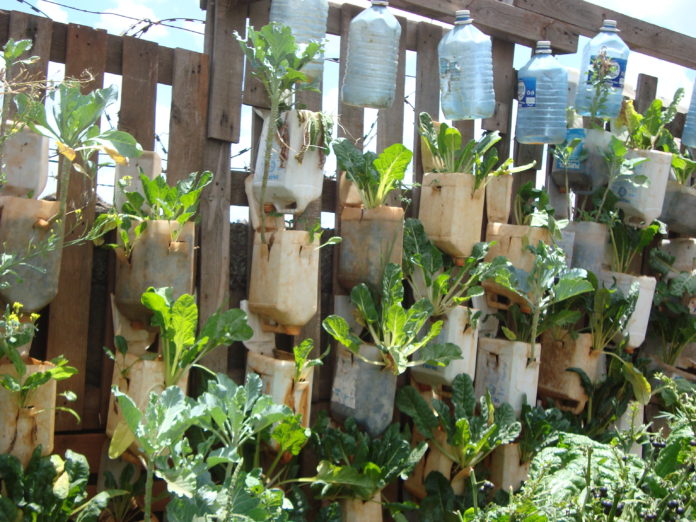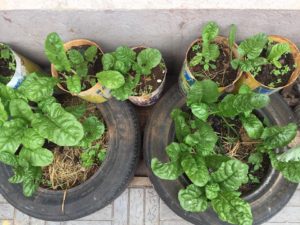By Henry Owino
Nairobi, Kenya: “No parent should cook stones to their children for lack of food… Food is a basic human right”. These were heartbreaking but realistic views from Elizabeth Kimani-Murage.
Kimani-Murage is an urban resident living in Runda estate, a residential apartment mostly associated with the wealthy people in Nairobi, Kenya. This, therefore, implies that whichever farming or agricultural activity is least expected in such swanky estates in Africa.
Reasons being habitants here tend to be overwhelmed with white-scholar jobs other than farming. However, with the arrival of the Covid-19 pandemic in the country, innovative kitchen garden farming has become adorable for most urban dwellers.
As much as food is one of the most basic human needs besides housing, clothing, and education, it is also important to eat fresh, safe, healthy, and nutritious diets most often. And this is what it means Right to Food not just mere food for the sake of filling tummy.
A tour in Nairobi estates gives evidence of urban farming taking shape, an answer to food inadequacy. Surprisingly, this farming is done within the compound’s backyard especially on the balcony, verandah or any available space in the residence.
For example, in Rongai, Matasia, Kasarani, Kinoo, Ruaka, Imara Daima, Dagoretti and Donholm, Langata the list is endless are some estates people think farming is impossible. Covid-19 pandemic really set the records enabling urban farming in such established estates.
Mrs. Beatrice Nekesa leaves in Mukuru slums and said she began farming in April as a result of lockdowns and curfew due to the Covid-19 pandemic. There were a crisis of food supply especially fresh vegetables and the little available became exorbitant.
“Covid-19 pandemic had negative impacts on urban residents who depend on food supply from upcountry. The containment measures worsen the situation as movements were restricted making transport of fresh foodstuff difficult,” Nekesa lamented.

“Only a few vehicles were licensed with limited liberty to deliver such foodstuff. So, prices shot up as demand became high. I thought of an alternative way of surviving, and kitchen garden horticulture was my choice,” Nekesa explained.
Many Nairobi residents sought other alternatives such as receiving foodstuff from the countryside as a parcel. However, this needed a lot of money to carter for transport cost services while those without relatives from the village had to buy.
It for these reasons that the kitchen garden started and soon became popular among Nairobi residents. In almost every estate and residential apartments, there are at least some vegetables such as roots, tubers, shoots, stems, leaves, fruits, and flowers of edible and mainly annual plants.
In Kawangware estate, residents no longer depend on foodstuff from parents back in the village. Their kitchen garden horticulture products grown either along the roadside or backyard compounds are mature.
“When I lost my job as a hotelier, I still needed to survive thus feed my family, dress, pay house rent among bills that required settling. I was stressed-up due to pressure from the Landlord, and children’s basic needs.” Maurice Wanjala disclosed.
“I thought of committing suicide. I had no money and the solution for me was to take away my life. Luckily, a friend advised me not to but engage myself in growing some vegetables in sacks and put them in the verandah,” Wanjala explained.
Today, Wanjala has expanded the kitchen garden, growing even maize and sweet potatoes in a nearby neighborhood. He even sells the surplus to the neighbors thus making a lot of money enough to pay for other expenses with ease.
At Mukuru Kwa Reuben slums, a group of widows is growing vegetables in sack gardens next to the Chief’s Camp. This urban farming has brought them together, enables them to pay house rents, feed families, bought house-furniture, and pay school fees for their children.
Sarah Ombija is one of the widows, in the group. She depends on the vegetables sells to manage her daily needs. She said apart from the group sack garden of kales, she has her own kitchen garden of onions, tomatoes and pepper at her residence.
“At my resident, I grow these other vegetables from the skills I got from our group training. Neighbors like them because of freshness, readily available and grown with purely organic mature,” Ombija revealed.
According to Kimani-Murage, foods grown through organic fertilizer are very healthy, safe, nutritious, and fresh. Organic fertilizers normally stimulate micro-organisms which are beneficial to the soil by improving its structure hence crops benefit maximally.
Kimani-Murage is an employee at APHRC as Senior Research Scientist and Lead Right to Food Initiative Officer. However, this kitchen garden at her residential apartment has nothing to do with this organization she works for.
To her, this is a private and self-drive initiative discovered as a result of the coronavirus pandemic in the country. She acknowledges that the motivation for starting the kitchen garden in a small idle space within her compound is a long break from work.
According to Kimani-Murage, to achieve this provision, a small space beside your house or within the compound can make the kitchen garden. It does not require any special skills, nor big land or big irrigation schemes but just a space in your backyard either in balcony, verandah or porch or any open-air gallery attached to the outside of the building.
Kimani-Murage, Senior Research Scientist and Lead Right to Food Initiative Officer at APHRC said kitchen garden crops tend to be ready for harvest sooner instead of waiting for several months hence mostly eaten while fresh not preserved.

“Interestingly, most such crops are usually healthy, nutritious, tasty, and safe for family meals compared to other grown with chemical fertilizers and take hours on transit before reaching markets,” Kimani-Murage said.
Kimani-Murage explains that most foods in urban areas like Nairobi are grown using synthetic fertilizers which is unfriendly to the environment and human beings as well.
“Of late, cases of cancer are on the increase mostly due to types of food people consume. So, to reduce chances of contracting cancer, I urge people to adapt kitchen garden where they grow and manage their own foods for safety,” she cautioned.
For Kimani-Murage kitchen garden initiative started due to ‘Stay at Home’ precaution measures issued by the government to tame the spread of coronavirus. So, it was blessings in disguise for her.
“This initiative came from ‘Stay at Home’ directives by the government as one of the Covid-19 containment measures. “Actually, I began this kitchen garden in April 2020 when the Covid-19 pandemic hit the country. So, working from home enabled me to venture into horticulture farming,” Kimani-Murage discloses.
She encourages Nairobi residents to make use of idle spaces in their compounds and plant some crops instead of spending money buying vegetables almost daily.
Kimani-Murage parting shot is that anybody can practice kitchen garden and feed their families therefore nobody should sleep on an empty stomach or go hungry for days due to lack of food.















